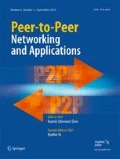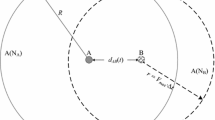Abstract
Mobile ad-hoc networks (MANETs) is a collection of wireless mobile nodes forming a temporary network without any fixed infrastructure or centralized administration. Although MANETs are easily deployed, they have several constraints such as; continuously changing topology, distributed operations, limitations of nodes radio interface. Recently, Ad-Hoc routing has become an important area of research due to the massive increase in wireless devices. Routing in MANETs is based on a cooperative multi-hop manner. However, due to the highly dynamic topology routing in MANETs is a true challenge. In this paper, we propose a new routing strategy for MANETs called Adaptive Hybrid Routing Strategy (AHRS). The basic idea of AHRS is to inform the network mobile nodes continuously with any changes in the network topology without flooding the network by a huge amount of control messages. AHRS is a hybrid routing strategy that can estimate failure time of links between network nodes through the historical information about link status. Accordingly, AHRS introduces not only the shortest available routes for data transmission, but also elects those reliable ones. AHRS uses no periodic routing advertisement messages but employs a special packet called ‘Carriage’ instead, thereby reducing the network bandwidth overhead and minimizing end-to-end transmission delay. AHRS has been compared against several well-known protocols, which are; DSDV, ZRP, AODV and DSR. Experimental results have shown that AHRS outperforms all competitive protocols as it introduces the minimal routing overheads, as well as a fast route delivery.




























Similar content being viewed by others
References
Ali AK, Kulkarni UV (2015) A state-of-the-art of routing protocols for mobile ad-hoc networks (MANET). Int J Comput Appl 0975–8887:127(12)
Ambhaikar A, Kumar Sharma L (2010) Exploring the behavior of mobile ad hoc network routing protocols with reference to speed and terrain range. Proceedings of the international MiiltiConference of engineers and Computer scientists vol. 2. IMECS 2010:17–19 March 2010
Mohemed RE, Saleh AI, Abdelrazzak M, Samra AS (2016) Energy-efficient routing protocols for solving energy hole problem in wireless sensor networks. Comput Netw 114:51
Cadger F, Curran K, Santos J, Moffet S (2016) Location and mobility-aware routing for improving multimedia streaming performance in MANETs. Wirel Pers Commun 86:1653–1672
El Khawaga SE, Saleh AI, Ali HA (2016) An administrative cluster-based cooperative caching (ACCC) strategy for mobile ad hoc networks. J Netw Comput Appl 69:54–76
Walia GK (2013) A survey on reactive routing protocols of the mobile ad hoc networks. Int J Comput Appl 64(22)
Ahmed I (2011) Saleh, a scalable-Adaptive snack routing strategy (SRS) for semi-administrated mobile ad hoc networks (SAMANETs). Int J Wireless Inf Networks 18(4):257–279
Saleh AI, Abo-Al-Ez KM, Abdullah AA (2017) A multi-aware query driven (MAQD) routing Prflootocol for mobile wireless sensor networks based on neuro-fuzzy inference. J Netw Comput Appl
Perkins CE, Bhagwat P (1994) Highly dynamic destination-Sequenced distance Vector routing (DSDV) for mobile Computers. Proceedings of ACM SIGCOMM'94, London
Saleh AI (2017) An Adaptive cooperative caching strategy (ACCS) for mobile ad hoc networks. Knowl-Based Systs
Singh R, Singh D, Kumar L (2011) Performance evaluation of DSR and DSDV routing protocols for wireless ad hoc networks. Int J Adv Networking and Appl 2(4):732–737
N. Karthikeyan, K. Periyakaruppan, S. Karthik, K. Srihari, (2014) Flooding Reduced-Destination Sequenced Distance Vector Routing Protocol. International Information Institute (Tokyo). Information, 17(8):3901–3908
Perkins CE, Royer EM (1999) Ad-hoc on demand distance Vector routing. Proceedings of the 2nd IEEE workshop on mobile Computing Systems and applications (WMCSA), pp 90–100
Saleh AI, Gamel SA, Abo-Al-Ez KM (2016) A reliable routing protocol for vehicular ad hoc networks. Comput Electr Eng
Tabatabaei S, Teshnehlab M, Mirabedini SJ (2015) A new routing protocol to increase throughput in mobile ad hoc networks. Wirel Pers Commun 83:1–14
Bhatt G, Lathigara A (2014) Enhancing route maintenance in RS-AODV. Int J Eng Res Appl 4(5):92–97
Hajlaoui R, Touil S, Achour W (2015) O-DSR: optimized DSR routing protocol for mobile ad hoc network. Int J Wirel Mob Netw (IJWMN) 7(4)
Johnson DB, Maltz DA (1996) Dynamic source routing in ad hoc networks. In: Imielinski T, Korth H (eds) Mobile Computing. Kluwer Publ, Dordrecht, pp 152–181
Johnson DB, Maltz DA, Broch J (2001) DSR: the dynamic source routing protocol for multi-hop wireless ad hoc networks. In Ad hoc networking, Addison-Wesley Longman Publishing Co., pp 139–172
Haas Z, Pearlman M (1998) The performance of query control schemes for the zone routing protocol. In proc. ACM SIGCOMM, pp 167–177
Swain S, Sinha S (2014) Comparison of AODV and ZRP Routing Protocols: A Simulation Based Analysis. Int J Comput Inf Technol (ISSN: 2279–0764), 3(03)
Lakhtaria KI, Patel P (2010) Analyzing zone routing protocol in MANET applying authentic parameter. Global J Comput Sci Technol 10:114–115
Makkar A, Bhushan B, Shelja TS (2011) Behavioral study of MANET routing protocols. Int J Innov Manag Technol 2(3)
Camp T, Boleng J, Davies V (2002) A survey of mobility models for ad hoc network research, in wireless communication and mobile Computing (WCMC): special issue on mobile ad hoc networking: research. Trends Appl 2(5):483–502
Author information
Authors and Affiliations
Corresponding author
Rights and permissions
About this article
Cite this article
Saleh, A.I., Arafat, H. & Hamed, A.M. An Adaptive hybrid routing strategy (AHRS) for mobile ad hoc networks. Peer-to-Peer Netw. Appl. 11, 561–578 (2018). https://doi.org/10.1007/s12083-017-0558-4
Received:
Accepted:
Published:
Issue Date:
DOI: https://doi.org/10.1007/s12083-017-0558-4




